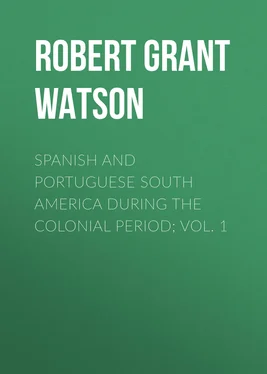Robert Grant Watson - Spanish and Portuguese South America during the Colonial Period; Vol. 1
Здесь есть возможность читать онлайн «Robert Grant Watson - Spanish and Portuguese South America during the Colonial Period; Vol. 1» — ознакомительный отрывок электронной книги совершенно бесплатно, а после прочтения отрывка купить полную версию. В некоторых случаях можно слушать аудио, скачать через торрент в формате fb2 и присутствует краткое содержание. Жанр: foreign_prose, История, foreign_edu, foreign_antique, на английском языке. Описание произведения, (предисловие) а так же отзывы посетителей доступны на портале библиотеки ЛибКат.
- Название:Spanish and Portuguese South America during the Colonial Period; Vol. 1
- Автор:
- Жанр:
- Год:неизвестен
- ISBN:нет данных
- Рейтинг книги:5 / 5. Голосов: 1
-
Избранное:Добавить в избранное
- Отзывы:
-
Ваша оценка:
- 100
- 1
- 2
- 3
- 4
- 5
Spanish and Portuguese South America during the Colonial Period; Vol. 1: краткое содержание, описание и аннотация
Предлагаем к чтению аннотацию, описание, краткое содержание или предисловие (зависит от того, что написал сам автор книги «Spanish and Portuguese South America during the Colonial Period; Vol. 1»). Если вы не нашли необходимую информацию о книге — напишите в комментариях, мы постараемся отыскать её.
Spanish and Portuguese South America during the Colonial Period; Vol. 1 — читать онлайн ознакомительный отрывок
Ниже представлен текст книги, разбитый по страницам. Система сохранения места последней прочитанной страницы, позволяет с удобством читать онлайн бесплатно книгу «Spanish and Portuguese South America during the Colonial Period; Vol. 1», без необходимости каждый раз заново искать на чём Вы остановились. Поставьте закладку, и сможете в любой момент перейти на страницу, на которой закончили чтение.
Интервал:
Закладка:
When Garabito was arrested, and when his papers were seized, there was a great commotion at Darien , and the friends of Nuñez were anxious to put him on his guard. Foremost amongst these was Arguello, who had embarked most of his fortune in his enterprise, and who now wrote him a letter urging him to put to sea without delay, and stating that he would be protected by the Geronomite Fathers at San Domingo , who had been sent out with full powers by Cardinal Ximenes, and who regarded with much approval the exploration of the Southern Sea. It was Nuñez’ extreme misfortune that this letter should fall into the hands of Pedrarias, and that the latter should by this means become convinced of the existence of a plot against his authority. Arguello was now arrested; but the governor, being fully convinced of Nuñez’ treasonable intentions, thought it necessary to have recourse to stratagem to get the latter within his power. Should he openly summon him to Darien , he did not doubt that he would lose no time in putting himself beyond his jurisdiction.
The mind of Pedrarias being thus a prey to fear and suspicion, he wrote an amicable letter to his Adelantado , requesting him to repair to Acla , to consult with him respecting the expedition; he at the same time ordered Pizarro to muster all the troops he could collect and to arrest Vasco Nuñez. The summons to proceed to Acla was instantly obeyed; and, unattended by any armed force, Nuñez, unconscious of having committed any crime, set out to meet his doom. On the road across the Isthmus, his frank and genial manners so gained on the messengers of Pedrarias, that the latter at length felt bound to warn him of his danger. They could not see this gallant cavalier fall into the snare set for him without speaking a warning word by which he might profit to effect his escape. But Nuñez was so unconscious of evil thought towards Pedrarias, that he declined to take advantage of the opportunity offered to him. He was soon afterwards met and arrested by Pizarro.
Nuñez once in his power, the spiteful governor lost no time in urging the alcalde mayor , Espinosa, to proceed against the Adelantado with the utmost rigour of the law. The charge against Nuñez was that of being engaged in a treasonable conspiracy to throw off the king’s authority and to assume an independent sway on the borders of the Pacific. The witnesses against him were Garabito and the sentinel who had overheard and misconstrued a portion of the conversation held between Nuñez and his officers at Isla Rica on the rainy night when it was resolved to despatch Garabito to Acla . Of the charge of treason against the crown Nuñez was entirely innocent. All that could be said against him was that, in case they should learn that Pedrarias had been superseded, he had agreed with his officers that they should sail on the expedition which Pedrarias had sanctioned without waiting for fresh orders from the new governor.
1517.
But it was in vain for Nuñez to be innocent; it was in vain that he indignantly repudiated the charge brought against him, pointing out that had he for a moment entertained the views attributed to him he would never have allowed himself to be entrapped into his present position. The mind of Pedrarias was hopelessly prejudiced against him, and the vindictive old man urged on the unwilling judge from day to day, heaping charge upon charge, until at length a sentence of death was pronounced against the accused. The judge recommended him to mercy on account of his services, or begged that at least he might be allowed to appeal. But these recommendations were lost on Pedrarias, and Nuñez was condemned to die. In the same sentence were included several of his officers as well as Arguello, who had written a letter to put him upon his guard. The informer Garabito was pardoned. In the public square of Acla , at the hands of the common headsman, the discoverer of the Southern Sea, at the early age of forty-two, expiated the crime of having aroused the jealousy of a narrow-minded official superior. The blow which then fell affected not Nuñez alone, but the whole Peruvian nation; for had he been permitted to carry out his proposed expedition, he would certainly have anticipated the discoveries of Pizarro, and, in view of the character of the two men respectively, who can doubt that the conquest of Peru would have had a widely different result?
CHAPTER IV.
LAS CASAS; HIS COLONY ON THE PEARL COAST
The history of the northern coast of South America, from the Gulf of Paria to the Isthmus of Darien , is intimately connected with the history of slavery during the century which succeeded the date of the discovery of the New World. Modern slavery in Europe (not including the Ottoman dominions) seems to have dated from the war between the Spaniards and the Moors, when such of the latter as were made prisoners were, under Ferdinand, as a matter of course, sold as slaves. It was a period when the Church was all in all as regards the European polity. Whatever the head of the Church chose to say was right, and became therefore right in the eyes of the sons of the Church. The will of the Sovereign Pontiff became law, and was appealed to as an ultimate court of reference throughout Christendom.
The state of public morality then existing amongst Christian nations, in respect to people and races not within the pale of Christianity, was more or less what it had been in the time of the Crusades. There was at the best merely a truce existing at any one time between the Christian and the Moslem powers. Their principles were antagonistic and incompatible. The days had not yet arrived when the Turk was to be called in as an ally by one Christian power fighting against another.
Such being the state of things when new islands and continents were suddenly discovered, no one in Christendom dreamed of questioning the absolute right of the Pope to dispose of them as he might see fit; and in accordance with this view, the line was originally drawn by Pope Alexander VI., fixing the limit of the Spanish and Portuguese territories respectively, first at a hundred leagues to the west of the Azores , and subsequently, by the Treaty of Tordesillas, at three hundred and seventy leagues to the west of the Cape de Verde Islands. By the Bull of May 2nd, 1493 (the year after the discovery of America), the Spanish sovereigns obtained the same rights, privileges, and indulgences in respect to the newly-discovered regions, as had been granted to the Portuguese with regard to their African discoveries, subject to the same condition of planting and spreading the Catholic faith. It was not for a moment considered in the matter that the natives of the newly-discovered regions possessed any rights whatsoever, saving such as might be granted to them by their Christian invaders, acting under the orders of the Catholic kings whose claims were sanctioned by the head of the Church.
It was but the fulfilment of the promise of Scripture that the heathen should be given to God’s people for an inheritance, and the uttermost parts of the earth for a possession; 8 8 Psalm ii. 8.
and thus, according to the opinion of the best ecclesiastical and legal authorities, it was fair and right to enslave such natives of the new countries as might oppose in arms the Christians who came to take possession of their lands, or who, being addicted to cannibalism, were beyond the pale of humanity. It is necessary to bear the above facts in mind in order to judge fairly the conduct of some of the greatest men of the period, including Prince Henry of Portugal and Columbus himself.
Prince Henry and Columbus were the two great originators of the geographical discoveries of the age. Either of the two was profoundly religious, and in the mind of each the ardour for propagating the true faith existed equally with the ardour for discovery. It is a strange and sad reflection that each one of those two great men—in some respects the greatest men of their age—was the originator of a new form of slavery. To Prince Henry is to be traced the origin of the enslavement of African negroes; to Columbus that of the system of encomiendas or partitions of Indians amongst Spanish settlers. Either system was productive of untold misery to large classes of the human race, and in one case the evil is not even yet extinct, as witness Brazil and Cuba . And yet the motives of Prince Henry in originating and sanctioning African slavery, were, without doubt, not only wholly unselfish, but were dictated solely by a desire for the spiritual enlightenment and civilization of the heathen. The motives of Columbus were perhaps more open to question. It is true that he himself, when on his last visit to Hispaniola he had seen the miserable results of the system which he had originated, declared to his sovereign that in sending home Indian captives to be sold as slaves he had been actuated solely by a desire for their spiritual welfare, and by the hope that they would return to spread civilization amongst their countrymen; but it is to be remembered that the motives of the great Genoese were not wholly pure, and that he himself repeatedly requested permission to send home Indians to be sold as slaves in order to diminish the expense to the crown in connection with the colony. He was rightfully rebuked by the pure-minded Isabella, who indignantly ordered such Indians to be returned to their country, and instructed the admiral that their conversion was to be brought about by the ordinary means, and not by their being enslaved.
Читать дальшеИнтервал:
Закладка:
Похожие книги на «Spanish and Portuguese South America during the Colonial Period; Vol. 1»
Представляем Вашему вниманию похожие книги на «Spanish and Portuguese South America during the Colonial Period; Vol. 1» списком для выбора. Мы отобрали схожую по названию и смыслу литературу в надежде предоставить читателям больше вариантов отыскать новые, интересные, ещё непрочитанные произведения.
Обсуждение, отзывы о книге «Spanish and Portuguese South America during the Colonial Period; Vol. 1» и просто собственные мнения читателей. Оставьте ваши комментарии, напишите, что Вы думаете о произведении, его смысле или главных героях. Укажите что конкретно понравилось, а что нет, и почему Вы так считаете.












